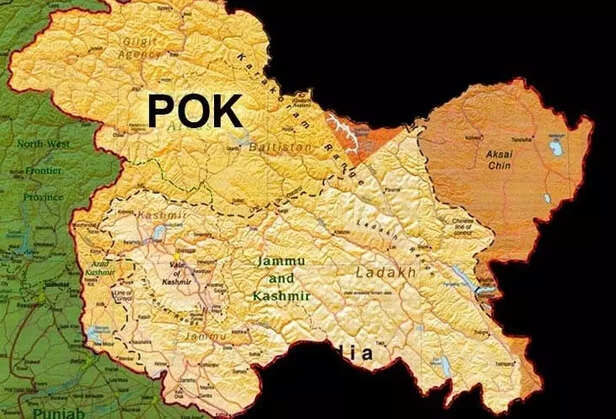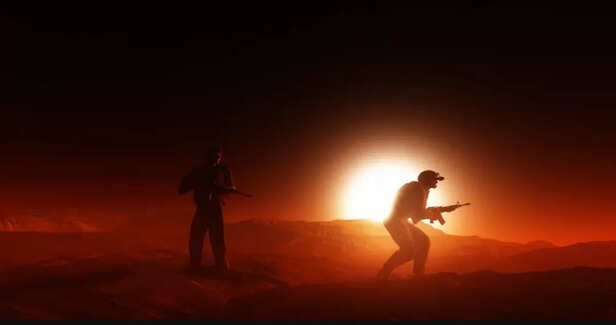Why No Response from India Even After Pakistan Violates the Ceasefire?
Ankit Gupta | May 11, 2025, 22:15 IST

Patience is not weakness. It can be strategy before impact. India’s leadership may not be ignoring the goal of PoK—it might just be waiting for the perfect geopolitical alignment where the cost is bearable and the outcome is irreversible.
When injustice rises, when adharma threatens to drown out the righteous—Dharma doesn’t whisper. It rises with fury. Today, that fury is simmering in every Indian heart.
Once again, Pakistan has violated the ceasefire. Once again, Indian soldiers bleed silently under the shadows of Himalayan ridges. Once again, a high-ranking Indian official gives a sterile briefing with "no questions taken." And once again, the nation is told to wait, stay calm, and "trust the process."
But for how long?
For how many more years must the soil of India be soaked in the blood of its sons while the oppressor escapes with a wagging finger and diplomatic indifference? Pakistan’s repeated ceasefire violations are not random. They are not tactical. They are provocations—each one a slap on the face of Indian sovereignty, each one a challenge to the soul of this ancient civilization.
Let’s stop sugar-coating it: Pakistan has been bleeding India for decades. From cross-border terrorism to using PoK as a terror hub, from mocking India's patience to exporting jihad under the garb of "freedom struggles"—Pakistan has weaponized cowardice and perfected it into an art.
And what do we do? Issue warnings. Call for restraint. Hold meetings. File diplomatic notes.
This is not diplomacy. This is paralysis.

Let us be blunt—the 2021 ceasefire agreement between India and Pakistan was a strategic illusion at best and a tragic farce at worst. It was signed not because Pakistan wanted peace but because it wanted time. Time to regroup. Time to rebuild terror infrastructure. Time to earn brownie points in the global narrative. Time to soften India.
And we gave it.
Even as Indian soldiers maintained discipline and honored the spirit of the agreement, Pakistan was busy violating it covertly. Drone drops, tunnel diggings, sniper attacks, radicalization in Kashmir—all of it continued. PoK, instead of being demilitarized, became a high-tech terror sanctuary, protected by Chinese investments and Pakistani deceit.
Ask yourself: has Pakistan ever honored any agreement in good faith?
From the Simla Agreement (1972) to the Lahore Declaration (1999)—every olive branch India has offered has been met with a dagger. Kargil happened despite Lahore. 26/11 happened after peace overtures. Uri and Pulwama were perpetrated under the guise of "non-state actors." And now, ceasefire violations are normalized as routine—like bad weather.

Every Indian knows it. Every map of India shows it. PoK is India. It's not just land; it's the stolen pride of Bharat Mata. The holy soil of Sharada Peeth, the ancient veins of Gilgit-Baltistan, the cultural legacy of the Indus Valley—they are being trampled upon by foreign boots while we pretend diplomacy will reclaim them.
Let it be said loudly: India does not covet PoK; India owns it.
In 1994, the Indian Parliament unanimously passed a resolution declaring PoK an inseparable part of India. It was not a symbolic gesture. It was a national vow. A commitment to the people of that land—abandoned, brutalized, brainwashed, and betrayed.
So when will this commitment be honored?
Every year we hold events, make statements, show maps. But the ground reality remains the same: PoK festers as a wound, mocked by the very forces who stole it. China now roams freely through Gilgit-Baltistan under the China-Pakistan Economic Corridor (CPEC), turning Indian territory into a corridor of colonization.
How long will we watch in silence?

Every nation has a threshold of tolerance. We crossed ours long ago. Now is not the time to "respect the LoC." Now is the time to redefine it. Pakistan has turned the Line of Control into a Line of Cowardice. It uses it to harass, attack, infiltrate, and retreat. We must use it to advance.
India has the military capability. It has geopolitical leverage. It has the moral high ground. What it needs is political courage.
Let Pakistan scream nuclear deterrence. Let China throw diplomatic tantrums. Let the world frown. If Israel can reclaim what is rightfully hers, if Ukraine can fight for its territorial integrity, if even the smallest Baltic nations refuse to be bullied—why must the world's oldest civilization act like it’s on probation?
It’s time India stops being the cautious giant. It’s time we roar—not whisper.
Mahatma Gandhi believed in non-violence, but even he said, “Where there is only a choice between cowardice and violence, I would advise violence.” Today, we don’t seek war. We seek justice. But justice denied for 77 years is injustice institutionalized.
The people of India are no longer in the mood for excuses. We do not want another "strongly worded statement." We want strongly delivered results.
Ceasefire violations are not technical breaches. They are acts of war. And PoK is not just a matter of map lines. It is a matter of national honor.
The silence must end. The resolve must rise. The mission must begin.
Let the world watch. Let the enemy tremble.
Because when Bharat decides, even fate cannot defy her.
Once again, Pakistan has violated the ceasefire. Once again, Indian soldiers bleed silently under the shadows of Himalayan ridges. Once again, a high-ranking Indian official gives a sterile briefing with "no questions taken." And once again, the nation is told to wait, stay calm, and "trust the process."
But for how long?
For how many more years must the soil of India be soaked in the blood of its sons while the oppressor escapes with a wagging finger and diplomatic indifference? Pakistan’s repeated ceasefire violations are not random. They are not tactical. They are provocations—each one a slap on the face of Indian sovereignty, each one a challenge to the soul of this ancient civilization.
Let’s stop sugar-coating it: Pakistan has been bleeding India for decades. From cross-border terrorism to using PoK as a terror hub, from mocking India's patience to exporting jihad under the garb of "freedom struggles"—Pakistan has weaponized cowardice and perfected it into an art.
And what do we do? Issue warnings. Call for restraint. Hold meetings. File diplomatic notes.
This is not diplomacy. This is paralysis.
The Painful Truth About Ceasefire "Agreements"

No Mercy, When Pok is the Matter
Let us be blunt—the 2021 ceasefire agreement between India and Pakistan was a strategic illusion at best and a tragic farce at worst. It was signed not because Pakistan wanted peace but because it wanted time. Time to regroup. Time to rebuild terror infrastructure. Time to earn brownie points in the global narrative. Time to soften India.
And we gave it.
Even as Indian soldiers maintained discipline and honored the spirit of the agreement, Pakistan was busy violating it covertly. Drone drops, tunnel diggings, sniper attacks, radicalization in Kashmir—all of it continued. PoK, instead of being demilitarized, became a high-tech terror sanctuary, protected by Chinese investments and Pakistani deceit.
Ask yourself: has Pakistan ever honored any agreement in good faith?
From the Simla Agreement (1972) to the Lahore Declaration (1999)—every olive branch India has offered has been met with a dagger. Kargil happened despite Lahore. 26/11 happened after peace overtures. Uri and Pulwama were perpetrated under the guise of "non-state actors." And now, ceasefire violations are normalized as routine—like bad weather.
The Sophisticated Desire

PoK Is Not a Dream, It Is a Commitment
Every Indian knows it. Every map of India shows it. PoK is India. It's not just land; it's the stolen pride of Bharat Mata. The holy soil of Sharada Peeth, the ancient veins of Gilgit-Baltistan, the cultural legacy of the Indus Valley—they are being trampled upon by foreign boots while we pretend diplomacy will reclaim them.
Let it be said loudly: India does not covet PoK; India owns it.
In 1994, the Indian Parliament unanimously passed a resolution declaring PoK an inseparable part of India. It was not a symbolic gesture. It was a national vow. A commitment to the people of that land—abandoned, brutalized, brainwashed, and betrayed.
So when will this commitment be honored?
Every year we hold events, make statements, show maps. But the ground reality remains the same: PoK festers as a wound, mocked by the very forces who stole it. China now roams freely through Gilgit-Baltistan under the China-Pakistan Economic Corridor (CPEC), turning Indian territory into a corridor of colonization.
How long will we watch in silence?
The Time to Cross Limits Is Now

War Sustains Existence
Every nation has a threshold of tolerance. We crossed ours long ago. Now is not the time to "respect the LoC." Now is the time to redefine it. Pakistan has turned the Line of Control into a Line of Cowardice. It uses it to harass, attack, infiltrate, and retreat. We must use it to advance.
India has the military capability. It has geopolitical leverage. It has the moral high ground. What it needs is political courage.
Let Pakistan scream nuclear deterrence. Let China throw diplomatic tantrums. Let the world frown. If Israel can reclaim what is rightfully hers, if Ukraine can fight for its territorial integrity, if even the smallest Baltic nations refuse to be bullied—why must the world's oldest civilization act like it’s on probation?
It’s time India stops being the cautious giant. It’s time we roar—not whisper.
What Will Reclaiming PoK Symbolize?
- Justice for generations of Indians whose land was taken by deceit in 1947.
- Closure for families of soldiers who died in wars defending a broken promise.
- Strategic Dominance over China's ambitions in the region.
- Religious and Cultural Revival, including access to Sharada Peeth, a seat of ancient Indian wisdom.
- Geopolitical Messaging to the world: India does not tolerate occupation. Not anymore.
From Patience to Power
The people of India are no longer in the mood for excuses. We do not want another "strongly worded statement." We want strongly delivered results.
Ceasefire violations are not technical breaches. They are acts of war. And PoK is not just a matter of map lines. It is a matter of national honor.
The silence must end. The resolve must rise. The mission must begin.
Let the world watch. Let the enemy tremble.
Because when Bharat decides, even fate cannot defy her.
